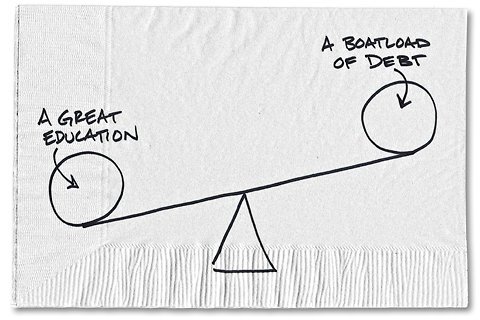
This weekend I began taking a look at the value of a 4 year college education compared to coding bootcamps that are popping up around the country. Since then, I've been performing some informal polling among friends to see how well college prepared them for their careers.
The Numbers
My 4 year degree required me to complete 120 credit hours of coursework. An average 3 credit class was either Monday-Wednesday-Friday for 50 minutes or Tuesday-Thursday for 75 minutes for a total of 150 minutes a week. That puts the average class at 2250 minutes total, or 37.5 hours. So to receive my required 120 credits, I would have to do 40 average classes at 37.5 hours or a total of 1500 hours in a classroom for a 4 year degree.Compare that to a coding bootcamp like Dev Bootcamp. They advertise a 19 week immersion program with up to 80 hours a week of coursework. This gives students a total of 1200 hours of coursework completed in about 4 months.Digging deeper into the numbers, only about half of my courses actually involved economics or a field where economics could be applied. This cuts my relevant classroom hours to about 750 hours of studying economics related fields.
Costs
The average cost of in-state tuition for the 2015-2016 school year was $9,410 per year for a total of $37,640 for the average 4 year degree. Dev Bootcamp charges $12,000-$14,000 depending on location for their coding classes.Per hour costs are as follows:
4 year degree: $50.19 per hour
Coding Bootcamp: $11.67 per hour
These are simply the costs of education and do not account for the cost of housing for 4 years vs 4 months or the fact that coding bootcamp attendees can start working almost 3 years sooner.
Career Preparation
I sent messages to every friend I had on social media asking them two questions:
1. Do you feel college prepared you for your career?
2. Would you recommend college for a new high school graduate?
An overwhelming majority of 63% (44 out of 70) said they felt college did not prepare them for their career. Many don't even have careers in their field. However, 68% said they would still recommend college to a new high school graduate due to the necessity of a degree on many job applications. This is creating a built in problem for new graduates as they are forced to compete in a more competitive job market by purchasing something that won't help them actually do their job.
Conclusion
These are raw numbers and there are many other things to consider when making the decision on college. How many jobs would recognize a coding bootcamp certification versus a degree from an accredited college? However, looking at these numbers quickly leads me to believe this model needs to be the future of education. It solves the issue of massive student debt, improves the economy by creating productive contributors sooner, and actually prepares students better by offering more time focused on intended field of study.I plan on continuing research, interviewing job recruiters and app academy attendees to get a comparison of quality of work and preparation.
This is a great aegument on college and the alternatives. I have taken 2.5 years of college for a Criminal justoce degree only to find out the college was over charging me roughly 13 thousand dollars. The course was supposed to be 60 credits to graduate and this college ended up charging me 96 total credits for all of the electives they deemed necessary, whixh turned out to be just another way of tacking on more costs. The bootcamp idea is great because simple colleges have lost their love to teach and have caught the all mighty greed bug. There nee ds to be a better end to the learning path. Great post.
I have Master of construction engineering degree, but I started to hate that job, now I do things that I love, earning less, but sleeping better
What do you do now?
I finished 2 years of teacher's course, I work in school now, I teach descriptive geometry
and music production, of course
College tuition in the states is absolutely crazy - virtually guaranteeing that you will be a debt-slave for the rest of your life.
Agreed. Now that we have an alternative model working for one field, I wonder how that model would apply to other fields.
It is funny how the canidates for the election try to push the free education issue, but refuse to make plans to fix the current problem if their ideas are not passed, which we knoelw the house and senate are going to kill any chance of that. Hopefully the model you speak of does catch on and other fields pick it up, then people might actually have a chance to further rheir lives and not be drowned in debt.
The model may work for coding but would it work for biology or accounting? There may be an even better way.
most employers look for a degree certificate if entering a profession, here in the UK for sure - average tuition ranges from £7-10k per year , but there are benefits on the student loan reagarding when it has to be paid back, believe its linked into how much you earn to start with..just begining to look into this for next year for my daughter, so sure to be surprised !